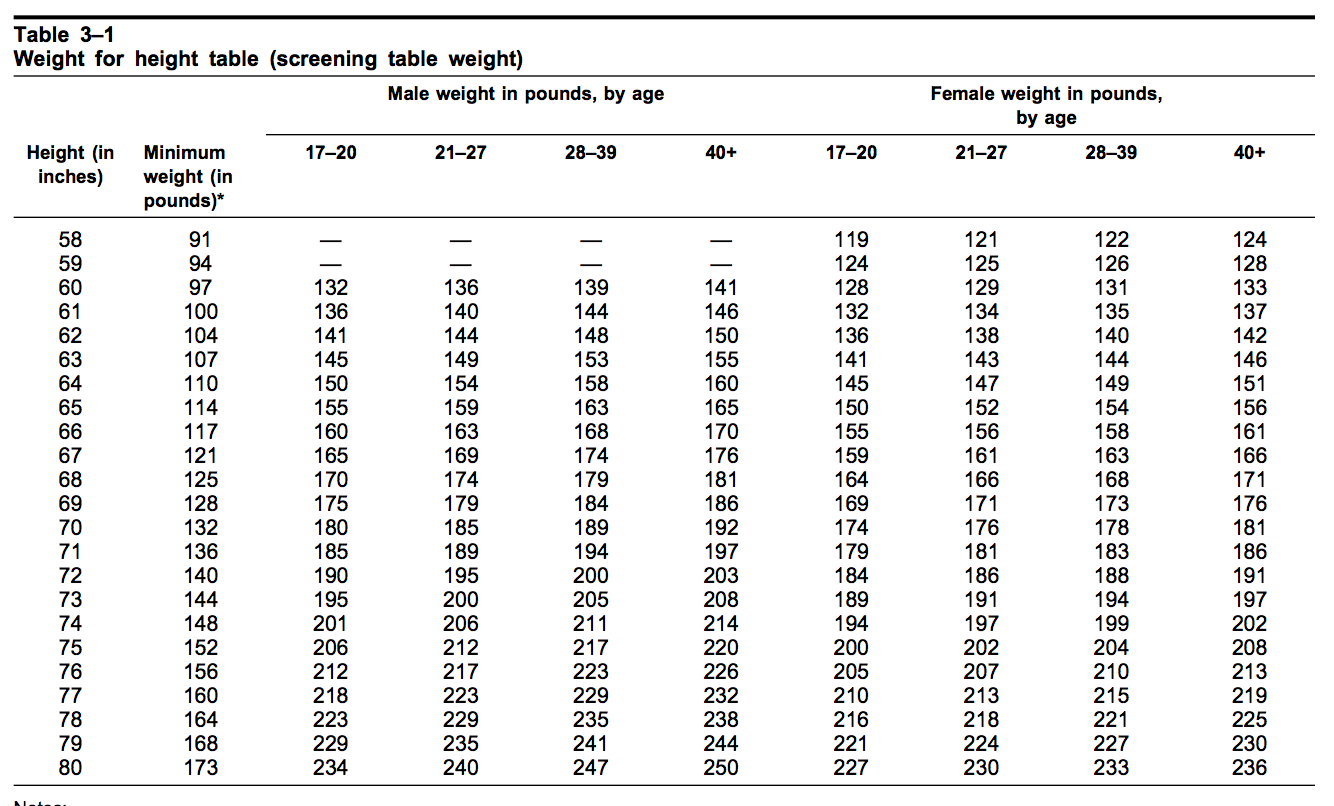The military has specific weight requirements that are crucial for ensuring that all personnel maintain optimal physical readiness. Understanding the Army weight requirement is essential for anyone considering a career in the armed forces. In this article, we will explore the various aspects of weight requirements, how they are determined, and their importance in the military context.
Weight standards play a significant role in the Army's overall fitness strategy, ensuring that soldiers are not only fit but also capable of performing their duties effectively. Each branch of the military has its own set of guidelines, but they all share a common goal: to maintain a force that is physically capable and mission-ready. In the following sections, we will delve into the specifics of Army weight requirements, including the factors that influence them and the consequences of not meeting these standards.
This guide is designed to provide you with the necessary information regarding Army weight requirements, whether you are a potential recruit, a current service member, or simply interested in military standards. By the end of this article, you will have a clearer understanding of how weight plays a critical role in military service.
Table of Contents
- Army Weight Standards
- Body Fat Calculation
- Importance of Weight Requirements
- Factors Influencing Weight Standards
- Consequences of Not Meeting Requirements
- Weight Management Tips for Soldiers
- Resources and Support
- Conclusion
Army Weight Standards
The Army establishes weight standards based on height and age, ensuring that all soldiers maintain a healthy weight in relation to their physical stature. Each soldier must meet these standards upon entry into the service and throughout their military career. The Army's weight standards are outlined in the Army Regulation 600-9, which provides guidelines on how to measure weight and body fat.
Weight Standards by Height
Weight standards vary according to height and are divided into categories for males and females. Here is a simplified chart:
- Height: 60 inches (5'0") - Maximum Weight: 140 lbs (Female), 150 lbs (Male)
- Height: 70 inches (5'10") - Maximum Weight: 176 lbs (Female), 202 lbs (Male)
- Height: 72 inches (6'0") - Maximum Weight: 186 lbs (Female), 210 lbs (Male)
Body Fat Calculation
In addition to weight, the Army also considers body fat percentage as a key indicator of physical fitness. The Army uses specific formulas to calculate body fat percentage based on measurements of the neck and waist. The acceptable body fat percentage varies by age and gender. Here are some general guidelines:
- Males: Maximum body fat of 20% for ages 17-20, 22% for ages 21-27
- Females: Maximum body fat of 30% for ages 17-20, 32% for ages 21-27
Importance of Weight Requirements
Maintaining the Army weight requirement is critical for several reasons, including:
- Operational Readiness: Soldiers must be physically fit to perform their duties effectively.
- Health and Safety: Excess weight can lead to health issues, affecting overall performance.
- Team Cohesion: Soldiers are expected to perform as a unit, and physical fitness contributes to team success.
Factors Influencing Weight Standards
Several factors can influence an individual soldier's weight standards, including:
- Age: Different age groups have varying weight standards.
- Gender: Males and females have different weight and body fat standards.
- Muscle Mass: Soldiers with higher muscle mass may weigh more but still meet fitness standards.
Consequences of Not Meeting Requirements
Failure to meet the Army weight requirement can lead to serious consequences, including:
- Reprimands: Soldiers may receive formal reprimands for failing to meet standards.
- Mandatory Weight Control Programs: Soldiers may be required to participate in programs aimed at achieving weight compliance.
- Discharge: Continued failure to meet weight requirements can result in administrative action or discharge from the service.
Weight Management Tips for Soldiers
For soldiers looking to maintain or achieve the Army weight requirement, here are some effective tips:
- Balanced Diet: Focus on a nutritious diet that includes fruits, vegetables, lean proteins, and whole grains.
- Regular Exercise: Engage in a mix of cardio, strength training, and flexibility exercises.
- Hydration: Drink plenty of water to stay hydrated and support overall health.
Resources and Support
The Army provides various resources for soldiers to help them meet weight requirements, including:
- Nutrition Counseling: Access to dietitians for personalized meal planning.
- Fitness Programs: Structured fitness programs to enhance physical conditioning.
- Peer Support: Encouragement from fellow soldiers to stay on track with weight goals.
Conclusion
In summary, understanding the Army weight requirement is essential for anyone in or considering military service. Maintaining a healthy weight and body fat percentage not only contributes to individual soldier readiness but also enhances overall unit effectiveness. We encourage you to take action by sharing this article, leaving comments, or exploring other resources on military fitness.
We hope this article has provided valuable insights into Army weight requirements and the importance of physical fitness in military life. Thank you for reading, and we look forward to your next visit!




